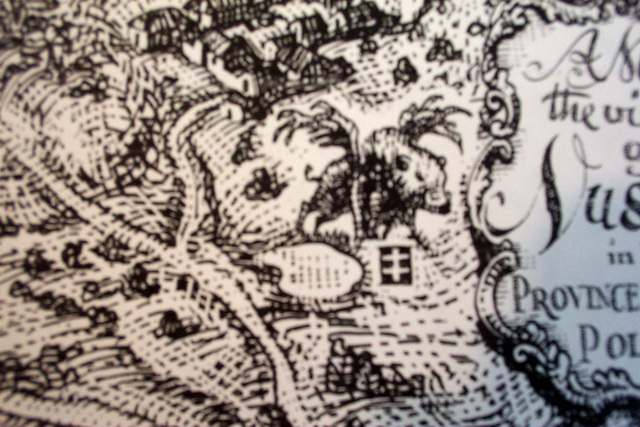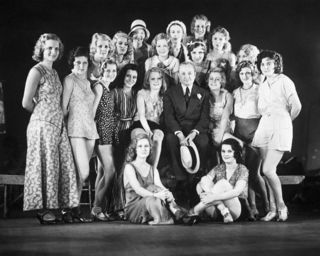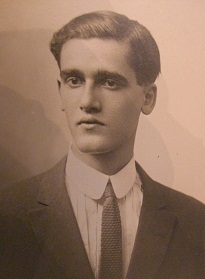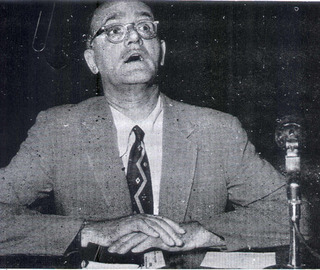Roth's Two Worlds I
**SEE "WORKS" SECTION (ABOVE) FOR GENEROUS PRE-PUBLICATION DISCOUNT**

Boyhood: The Shtetl and the Lower East Side
A sthetl (Nuszcze in Galicia) was a pre-modern community of middlemen selling the clothing and implements customers, mostly peasant farmers, needed. The Jews in the town were Hassidic, and resisted the enlightenment which had allowed a measure of integration into Christian society. Sam Roth was exorcised by the Rabbi in his sickbed when he "saw" at age 8 a Demon at the moment when he first felt desire. He resented that, and also wondered why wealthier shtetl residents had the best seats in the synagogue, and received more visits from the Rabbi than poorer people.
Here was the start of Sam's two worlds--the one where sex meant the intrusion of the Rabbi to cleanse him of Evil and his private one which flooded him with irritation as well as guilt at not being able to express desire. His father slept with him to prevent the return of that demon (i.e., the impulse to masturbate).
His father, Yussiff Leib Roth, had to leave for America after an argument with the Lord of the Manor. Almost two years of poverty followed before the rest of the family received money for steerage to NY. Once there, Samuel fought the Irish boys on the Lower East Side, developed his first crush on a movie star, encountered porno below the counter of the man he worked for, and grieved for girls who had to become prostitutes to survive. "If you say one word about love," one told him when he tried to "save" her, "I'll break your head open."
Poverty: "the red ribbon on the white horse"
This Talmudic phrase connotes poverty, which for Hasidic devotion is the pious man's crowning glory. But for immigrants to the Lower East Side, , the pious ascetic found little place, for he could not support himself. No source of charity, no tradition of support for the community's scholars of Pentateuch and midrash, had outlived lack of money. As Roth's father put it, "We are poor, we must work." Poverty in America meant the opposite of holiness. It meant living death, humiliation, emasculation. To avoid it, Roth published works without the authors' permission, distributed porno and tons of borderline "schmutz," and finally made a small fortune writing teasing mail order circulars.
But his self-image, the "still small voice within" (largely in the heavenly timbres of Yeshea) would not let him rest with venality. He understood too many of the social and emotional results of entertaining people with appeals to their prurient minds and compulsive fears of unchaining themselves from its solitary comforts. God says to us, "Where are you?" Roth answered with a life-long struggle towards fulfilling the destiny forged for him in the "True World." But with how much suffering? That red ribbon was terrifying to him--it meant holiness through washing away all the worldly benefits of the American Dream in which he had indeed invested everything. Like almost everyone else, he nursed that investment with heart, hands, and a very American ingenuity.
A Roth-Wracked James Joyce posts an International Protest
Roth's publications of Ulysses, Lady Chatterley's Lover, and other British writings of an erotic nature were not piracies: they were in the public domain in the US because of the lack of an international copyright agreement and because works considered obscene were not granted copyright. Joyce's supporters devised an International Protest against Roth after portions of Ulysses appeared in Roth's Two Worlds Monthly, which over 160 writers signed, stating correctly that acts such as his, offering a writer a fee after the work appeared, were dishonest.
His recklessness made him an international literary pariah. Joyce and his circle had literary "capital," to use a word that refers to the business of publishing and of celebrity. Roth did not. They spun facts in their favor as much as Roth spun the legalities of copyright in his. Newspapers and literary magazines reported that Roth "cruelly bowdlerized" Ulysses (he changed less that Pound did for The Little Review a few years earlier), and that he published excepts from Work in Progress without payment or permission (both false).
When he expurgated Lady Chatterley's Lover so that he could publish it for general readers without being arrested for obscenity, he admitted not getting permission ("to ask would have been to be denied" since he could pay much). He wrote to Lawrence's widow saying he would send her royalties as soon as she ok'ed his edition. That, and his high-handedness with Ulysses, is the sort of CHUTZPAH that cemented his reputation, especially since he copyrighted his barbered version.
Roth's "piracies" took place in the 1920s and 30s. After that, he published very good writers in remainders acquired from the original publisher. Even Ezra Pound acknowledged that he brought to a large readership literature they would not have been exposed to at a price they could afford. Roth knew good writings intimately—and loved it.
Roth took whatever advantage he could of lack of copyright, but he did pay writers, although at the lowest rate he possibly could. Sometimes, good young writers started their careers with him, for the same reason they did with sex pulp and mystery paperback publishers in the 40s and 50s.
"A Perversion in the Mind of Sam Roth"
Roth's literary perversion was the opinion of the writer, and Roth author, Harry Roskelenko. He was referring to Roth's need to include himself and his ideas in books he published. The following have interpolated passages doing so:
Kiki's Memoirs
Maxwell Bodenheim (?), My Life and Loves in Greenwich Village
Havelock Ellis, Kanga Creek
Roth never stopped talking about himself. His own novel Bumarap has an Afterword "Introducing the Author." His edition of Havelock Ellis' Kanga Creek contains an essay published under one of his pseudonyms, "Norman Lockridge," Lockridge has Ellis state that his close friend Olive Schreiner will become a muse or inspiration to men and women struggling with "brutal and reckless forces." One of these is "an Austrian Jew" (Roth, treated brutally and ostracized by Joyce and his friends).
On two occasions Roth interpolated passages about himself into books written by his ghost-writers. The most remarkable is a book purportedly a recording of notes written by Nietzsche after his emotional breakdown: My Sister and I. This fascinating work was probably a hoax (although some careful readers, including Wilhelm Reich, thought it genuine). A talented ghost-writer, David George Plotkin, is a strong candidate for author. Some passages are, however, clearly in Roth's style, and indicate Roth's self image as iconoclast and prophet.
As he approached retirement five years before his death, he wrote three "redactions"—that is, his own versions—of three strange and powerful works, each classics of agonizing self-awareness, strident challenges to restraints on human desire. A fine poet in his youth, he regained his skills in some of his versions of Heine and the Psalms.
Heine's Jewish Melodies
Artaud's Heliogabulus: The Crowned Anarchist
The Psalms of David

Gallery of pictures of Samuel Roth
-x_small.jpg)





